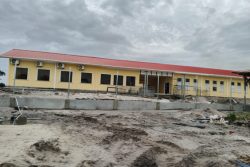Last year was confirmed as the hottest year on record by the World Meteorological Organisation (WMO). In a report issued in January this year, the WMO stated that the average global temperature, which was measured using six leading international datasets, was “1.45 ± 0.12 °C above pre-industrial levels”. The report further stated, “global temperatures in every month between June and December set new monthly records. July and August were the two hottest months on record.”
This year is about to push the boundaries on those numbers. The US-based National Oceanic and Atmospheric Administration (NOAA) has pointed out that both April and May 2024 were “the warmest on record” particularly in South America and Europe. No one needs a crystal ball, the WMO or the NOAA to know that June will follow the same pattern. It’s already a scorcher.
The warmer weather has also ushered in what is still being referred to as a serious outbreak of dengue. Almost since the beginning of the year, the viral infection spread by the Aedes aegypti mosquito, which can be fatal in severe cases, has been rampaging across the Americas. As early as February, the Pan American Health Organisation (PAHO) issued an epidemiological alert calling on governments to intensify mosquito control efforts. This was in view of the fact that by then almost 700,000 cases had been reported, along with 102 deaths in this part of the world. According to PAHO, that was a 157% increase over the same period last year and therefore cause for concern.
By early March, neighbouring Brazil alone, had around one million cases of dengue and at least 214 deaths. Peru had 135,000 cases and 117 deaths. In May, PAHO issued another such alert, pleading with governments to accelerate surveillance, diagnosis and vector control. At that time, according to data collected by PAHO, there were more than 8.1 million suspected cases of dengue in this region with over 3,600 deaths.
Increased cases of dengue and severe dengue, which can be fatal, are also an issue for Guyana. Given the warnings from PAHO, one might have expected more of a response from the Ministry of Health. While there has been some movement on mass fumigation, it has not been streamlined, which means that some areas are treated and others are not. Late last month, the Guyana Sugar Corporation’s Training School at Port Mourant was temporarily closed after a dengue outbreak. More recently, a 22-year-old man, Karon Thompson, died of severe dengue at the Diamond Regional Hospital.
Dengue is not a new disease. It has been around for quite a while. Unfortunately, there is no specific treatment for dengue. To date, there are two licensed vaccines, one of which is only given to people who previously had dengue; the other mostly for children aged six to 16 years old. In this part of the world, we are used to hearing about dengue because its vector, the Aedes aegypti mosquito, which also spreads yellow fever, chikungunya and zika, thrives in warm weather. It is well known that it breeds in stagnant water, like tanks used for water storage, which are ubiquitous in this country. Among its other breeding places are ponds, flower vases, discarded rubber tyres, and plastic bottles.
Many years ago, when Georgetown was a clean city, public health officers employed by the Mayor and City Council (M&CC) visited residences periodically. Among other things, they checked for breeding grounds of the Aedes aegypti mosquito, often requiring citizens to get rid of vessels or used tyres that held water and warning them against violating public health rules. Every dwelling had a house inspection card, which the officers signed and dated once they found everything in order. One imagines that the same attention was given to other towns as well.
Fast forward to today: municipalities no longer seem to have public health inspectors on staff. However, the Ministry of Health should surely have picked up the slack. While deploying health visitors might not be conducive, what is preventing the ministry from using other methods, like mass and social media to get the message out? Aside from a press release in April, in which Minister of Health Dr Frank Anthony urged people experiencing fever to go and get tested, there has not been much of an outreach. As a medical doctor, Dr Anthony should be well aware that not everyone who contracts dengue gets symptoms, which includes fever. However, according to the World Health Organisation (WHO) mosquitoes can become infected by people who have dengue, whether they are symptomatic or not. Those mosquitoes can then pass the virus onto other humans, when they bite them, the WHO said.
Therefore, it is imperative that people be informed about prevention methods. For example, the fact that the Aedes aegypti mosquito is active during daytime hours and there is a need to cover up and use safe repellents. Further, to ensure that day sleepers – especially babies, children and the elderly – are underneath mosquito nets. Moreover, householders should be encouraged to prevent mosquitoes from breeding through proper solid waste disposal and removal of any containers that can hold water. The covering of water tanks and other storage containers must be mandatory. Additionally, since there is no specific treatment, the public should be told what to use at home for mild cases of dengue. For instance, non-steroidal anti-inflammatory drugs like ibuprofen and aspirin, which people tend to reach for when they have pain or fever, are not recommended when one has dengue.
The fact that dengue is now extremely prevalent in Europe and North America is a sign that this year’s outbreak could very well exceed what occurred previously. The number of cases and deaths in Brazil and Peru are also a signal. Guyana needs to be far more proactive as our health infrastructure cannot deal with a crisis of any magnitude. There will be a huge cost to pay for doing little in the hope that it blows over as has happened in the past.








